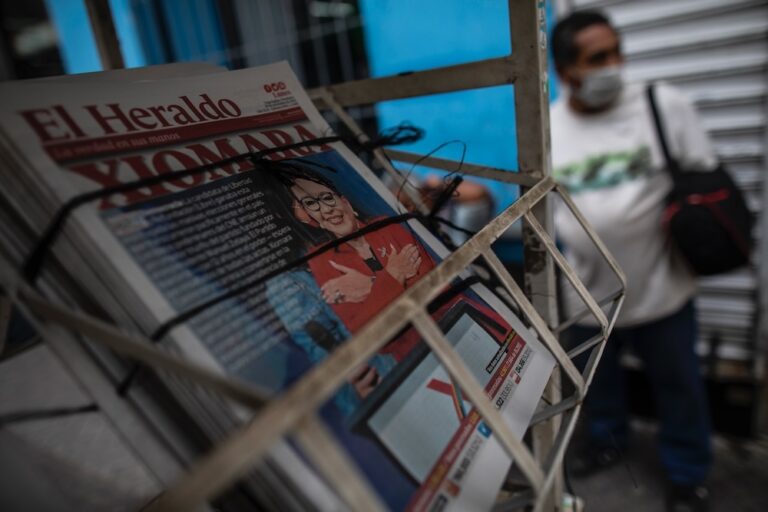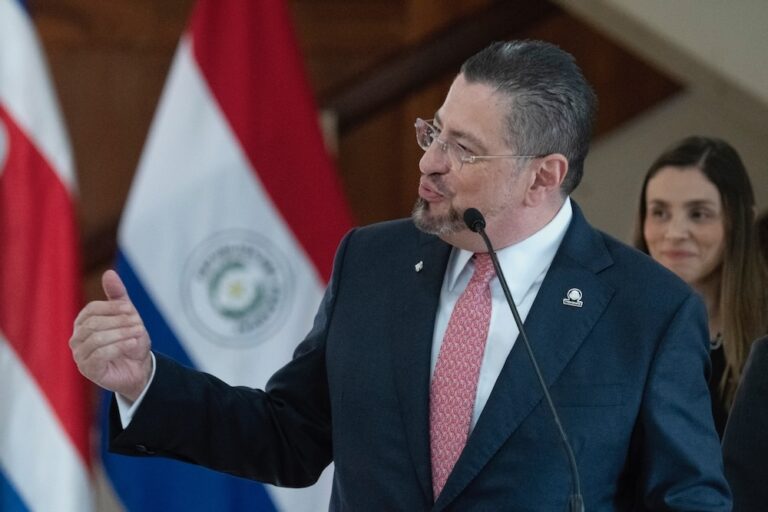June 2023 in the Americas: A free expression round up produced by IFEX's Regional Editor Laura Vidal, based on IFEX member reports and news from the region.
Peru rejects “Ley Mordaza” as journalists and institutions rally to defend press freedom. Cuba’s new Social Communication Law tightens control on independent media. Guatemala witnesses attacks on journalists while fears and high expectations escalate after first round of elections. Argentina sees violent crackdown on protests, including detentions of journalists. Meanwhile, OAS appoints new commissioners, and cases of government censorship spark outrage in the United States.
A triumph: Peru rejects “gag law”
In a decisive second vote, Peru shut down the proposed “Gag Law,” a potential threat to press freedom and freedom of expression. The rejection of a law which was aimed at imposing harsher penalties for defamation marks a significant triumph for the country’s journalistic institutions.
The National Association of Journalists (ANP) and the Institute of Press and Society (IPYS) celebrated this outcome, attributing it to their sustained mobilization and the active protests of colleagues in Lima and other regions.
Apprehensions continue among civil society organizations, however. The inclinations of authorities to employ legal mechanisms to suppress journalists who dare to be critical or inconvenient remain.
Cuba’s new law another setback for independent media
The approval of the Social Communication Law by the National Assembly of People’s Power represents another setback for freedom of expression and independent media outlets in Cuba. The law aims to regulate the media landscape on the island, but it disproportionately limits the voices of independent news organizations. According to the legislation, news agencies, radio, television, and print and digital media are deemed “socialist property of all the people” or affiliated with political, mass, or social organizations, effectively excluding the independent press.
The Inter American Press Association (IAPA) and Reporters Without Borders (RSF) strongly condemned the law’s approval, highlighting the regime’s clear intent to enhance censorship through administrative and legal restrictions, thereby stifling social discontent. While the Cuban constitution supposedly guarantees the right to access truthful and objective information, journalists and organizations argue that this right is not fully honored. The new regulation largely limits public information to State media, acting as intermediaries.
Curiously, the law introduces provisions that permit State media to obtain funds through “socialist advertising” and international sources, creating a potential contradiction with the regime’s anti-capitalist ideology. Article 51 of the law, within the section on “social communication in cyberspace,” affirms the need to protect content and its use by third parties, both national and foreign, unless explicit user consent or authorization from competent authorities is granted. Furthermore, the law prohibits the creation of distorted realities using preexisting images, text, audio, and video content.
It is difficult to see this new legislation as anything but another step from Cuban government to gradually instrumentalize laws to control access to information and discourage critics. In 2021, for example, the government enacted regulations criminalizing the dissemination of “false” and “offensive” information online, granting authorities expanded powers to suppress online speech. The legislation specifically bans the spread of false news or messages and content deemed offensive or inciting actions that disrupt public order. Additionally, it establishes a mechanism for citizens to report potential infractions, while those deemed to be attempting to “subvert the constitutional order” can be labeled as “cyberterrorists”.
Guatemala: Freedom of expression under threat in the midst of presidential elections
The recent sentencing of journalist José Rubén Zamora to six years in prison has sparked concerns about the state of freedom of expression in Guatemala, particularly in light of the ongoing presidential elections. Media outlets and organizations widely criticized the sentence as an attack on press freedom, fearing its impact on the country’s democratic processes. The lack of judicial independence in Guatemala has drawn strong criticism from the IAPA, which views Zamora’s conviction as a further exacerbation of the threats faced by journalism. According to the Association, this case is a clear example of how the justice system is being used to silence critical voices.
The network Rompe el Miedo Guatemala, operated by ARTICLE 19 Mexico and Central America, has also expressed concerns about Zamora’s sentencing, highlighting the broader trend of increased attacks against journalists and human rights defenders in Guatemala. With the sentencing occurring just ahead of the general elections, worries are growing regarding the potential impact on freedom of expression and democracy in the country. In an interview with El Hilo, Zamora himself emphasized that his case is not an isolated incident but part of a larger pattern of attacks against journalists in Guatemala.
In May, eight international organizations, supported by two freedom of expression and press advocacy networks, including IFEX-ALC, visited Guatemala to assess the situation in the lead-up to the general elections. The mission highlighted the stigmatization, criminalization, and judicialization of journalists and communicators in the country.
As the second round of the elections approaches, expectations are high, fueled by growing anger over political corruption and the erosion of democracy. However, on election weekend the centrist candidate Bernardo Arévalo surprisingly secured a spot in the second round, competing against establishment figures such as Sandra Torres, a veteran politician and former first lady with corruption allegations, and Zury Ríos, the daughter of former military dictator Efraín Ríos Montt.
Arévalo’s unexpected emergence as a frontrunner has thrust him into the spotlight, with a runoff scheduled for 20 August 20, attracting significant attention as the nation eagerly awaits the results.
Argentina: Repression and detentions in Jujuy
The approval of a new provincial constitution has sparked unrest in Jujuy, Argentina, and brought violent crackdowns against protesters and journalists. The protests have lasted for nearly two weeks, escalating over the weekend of 20 June, which resulted in the arrest of around twenty individuals and two journalists. Indigenous communities, unions, and social organizations have risen up against a constitutional reform that was passed in less than a month and was approved in a closed-door session.
Human rights organizations have denounced the fact that the new constitution did not consult citizens, criminalizes the right to protest, and ignores the voices of indigenous peoples in the region concerning the use of the lands they inhabit, an area of the country known for mining and lithium exploitation.
The Argentine Secretary of Human Rights has denounced the “fierce repression” in Jujuy, following the detention of dozens of people during police operations against the constitutional reform protests. The Forum of Argentine Journalism (FOPEA) also joined the outcry, calling out the authorities for the detention of two media workers who were “clearly identified.”
“Colleagues Luciano Aguilar (La Izquierda Diario) and Camilo Galli (correspondent in Quebrada for the digital newspaper El Submarino) were covering the police repression against indigenous activists and residents protesting the constitutional reform,” stated FOPEA on social media. “Amid shoving and blows from police officers, they were dragged, forced into a police van, and transported to the Alto Comedero prison, 60 kilometers away from the scene.”
FOPEA also expressed concern about the inclusion of the phone numbers of two journalists on a list of lines inspected by the Justice of Jujuy.
In brief
The 53rd OAS assembly re-elected Commissioner Stuardo Ralón of Guatemala and elected Christopher Arif Bulkan of Guyana, Gloria Monique de Mees of Suriname, and Andrea Pochak of Argentina to integrate the plenary of the IACHR for the period 2024-2027.
United States: PEN America responded to the removal of Ta-Nehisi Coates’ acclaimed memoir, Between the World and Me, from an advanced placement course in South Carolina as “outrageous government censorship”. Earlier in June, students in a Chapin High School classroom reported a teacher for including Ta-Nehisi Coates’s memoir and two related short videos in her argument essay unit. The unit, part of the preparation for the AP Language test, which holds credit value for many colleges, featured thought-provoking questions like: “Do you think racism is a pervasive problem in America? Why or why not?”
RSF strongly condemned the conviction of reporters Matilda Bliss and Veronica Coit on 16 June for trespassing in the United States. The journalists were apprehended during their coverage of an after-hours police operation targeting a homeless encampment in a public park in Asheville, North Carolina, on Christmas night 2021. RSF raised concerns about the implications this verdict has for press freedom and the ability of journalists to report on issues affecting vulnerable communities.



